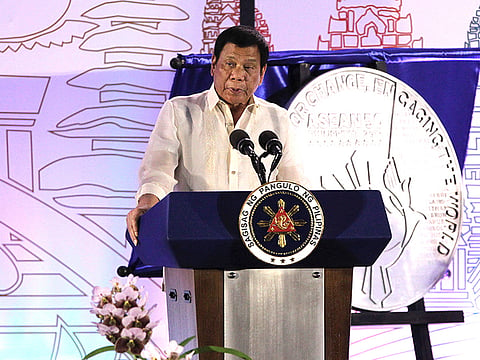Duterte orders troops to blast militants and their hostages
Loss of civilian lives in such an attack is “collateral damage”, president says

Manila, Philippines: Philippine President Rodrigo Duterte said he has ordered his troops to bomb extremists who flee with their captives in a bid to stop a wave of kidnappings at sea, calling the loss of civilian lives in such an attack “collateral damage.”
Duterte has previously stated that he had told his Indonesian and Malaysian counterparts their forces can blast away as they pursue militants who abduct sailors in waters where the three countries converge and bring their kidnap victims to the southern Philippines. He said in a speech late Saturday that he had given the same orders to Filipino forces.
He said he instructed the navy and the coast guard that “if there are kidnappers and they’re trying to escape, bomb them all.”
“They say ‘hostages.’ Sorry, collateral damage,” he said in a speech to business people in Davao, his southern hometown.
He said such an approach would enable the government to get even with the ransom-seeking militants. “You can’t gain mileage for your wrongdoing, I will really have you blasted,” he said.
His advice to potential victims? “So, really, don’t allow yourselves to be kidnapped.”
Duterte’s remarks reflect the alarm and desperation of the Philippines, along with Malaysia and Indonesia, in halting a series of ransom kidnappings primarily by Abu Sayyaf militants and their allies along a busy waterway for regional trade.
On Saturday, ransom-seeking Abu Sayyaf gunmen freed a South Korean captain and his Filipino crewman who were abducted three months ago from their cargo ship.
The gunmen handed skipper Park Chul-hong and Glenn Alindajao over to Moro National Liberation Front rebels, who turned them over to Philippine officials in southern Jolo town in predominantly Muslim Sulu province.
The Moro rebels, who signed a 1996 peace deal with the government, have helped negotiate the release of several hostages of the smaller but more violent Abu Sayyaf, which is blacklisted by the US as a terrorist organisation for kidnappings, beheadings and bombings.
Duterte’s adviser dealing with insurgents, Jesus Dureza, said he was not aware of any ransom being paid in exchange for the freedom of the sailors. At least 27 hostages, many of them foreign crewmen, remain in the hands of different Abu Sayyaf factions, he said.
There have been persistent speculations, however, that most of the freed hostages have been ransomed off.
Without a known foreign source of funds, the Abu Sayyaf has survived mostly on ransom kidnappings, extortion and other acts of banditry.
A confidential Philippine government threat assessment report seen by The Associated Press last year said the militants pocketed at least 353 million pesos ($7.3 million) from ransom kidnappings in the first six months of 2016.
The militants have mostly targeted slow-moving tugboats in the busy sea bordering the southern Philippines, Malaysia and Indonesia.
Box
Duterte threatens martial law
Manila: Philippine President Rodrigo Duterte has threatened to impose martial rule to prosecute his deadly war on drugs, three decades after the nation shed dictatorship with a famous “People Power” revolt.
“If I wanted to, and it [the illegal drugs problem] will deteriorate into something really very virulent, I will declare martial law if I wanted to. No one will be able to stop me,” Duterte said in a speech on Saturday night.
The 71-year-old former state prosecutor said the aim would be “to preserve the Filipino people and the youth of this land”.
Duterte won elections in May last year on a pledge to wipe out illegal drugs, promising an unprecedented crackdown to stop the Philippines from becoming what he termed a narco state.
The crackdown has left at least 5,700 people dead in just over six months, raising concerns of a breakdown in the rule of law with security forces and vigilantes carrying out extrajudicial killings.
The Philippines’ longtime ally, the United States, has led international criticism of the killings, with outgoing President Barack Obama urging Duterte to prosecute his war “the right way”.
Duterte has reacted furiously to the criticism and vowed to continue his war until illegal drugs are eradicated.
Duterte has raised the prospect of imposing martial law previously.
However Saturday’s comments were the most direct threat.
Martial rule would allow Duterte to use the military to enforce civilian law and detain people at length without charging them.
The Philippines last endured martial law during the 20-year rule of dictator Ferdinand Marcos, who was accused of plundering billions of dollars from state coffers and overseeing widespread human rights abuses.
Marcos declared martial law in 1972, invoking the threats of crime and a communist insurgency, and lifted it in 1981.
His rule ended in 1986, when millions took to the streets in the largely bloodless military-backed “People Power” revolt.
A new constitution drawn up in 1987 in an effort to avoid another dictatorship specified a single six-year presidential term.
It also said the president could impose martial rule for just 60 days and only to stop an invasion or a rebellion.
Parliament can revoke the measure within 48 hours while the Supreme Court can review its legality.
But Duterte, speaking to local businessmen in his southern hometown of Davao city, warned he could ignore the 60-day limit.
“The 60-day (limit) will be gone,” he said.
“And I’d tell you now, if I have to declare martial law, I will declare it — not about invasion, insurrection, not about danger. I will declare martial law to preserve my nation — period,” he said.
-AFP



